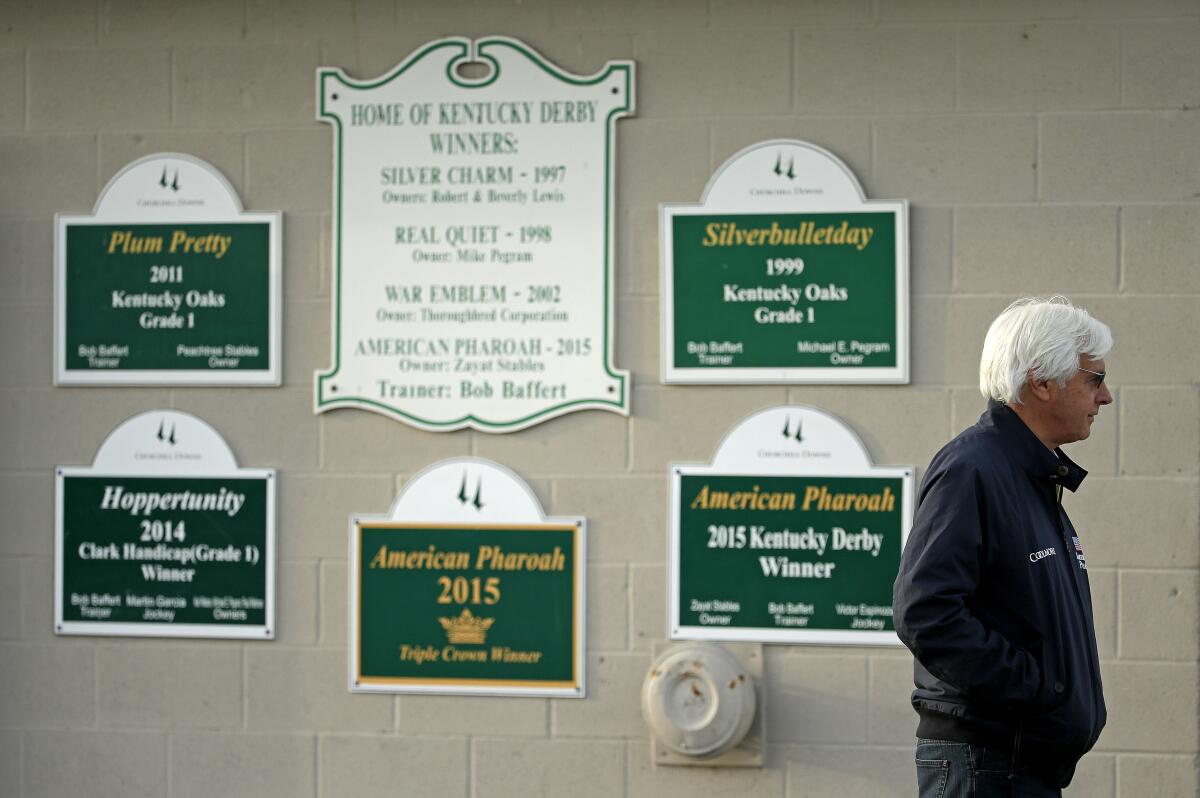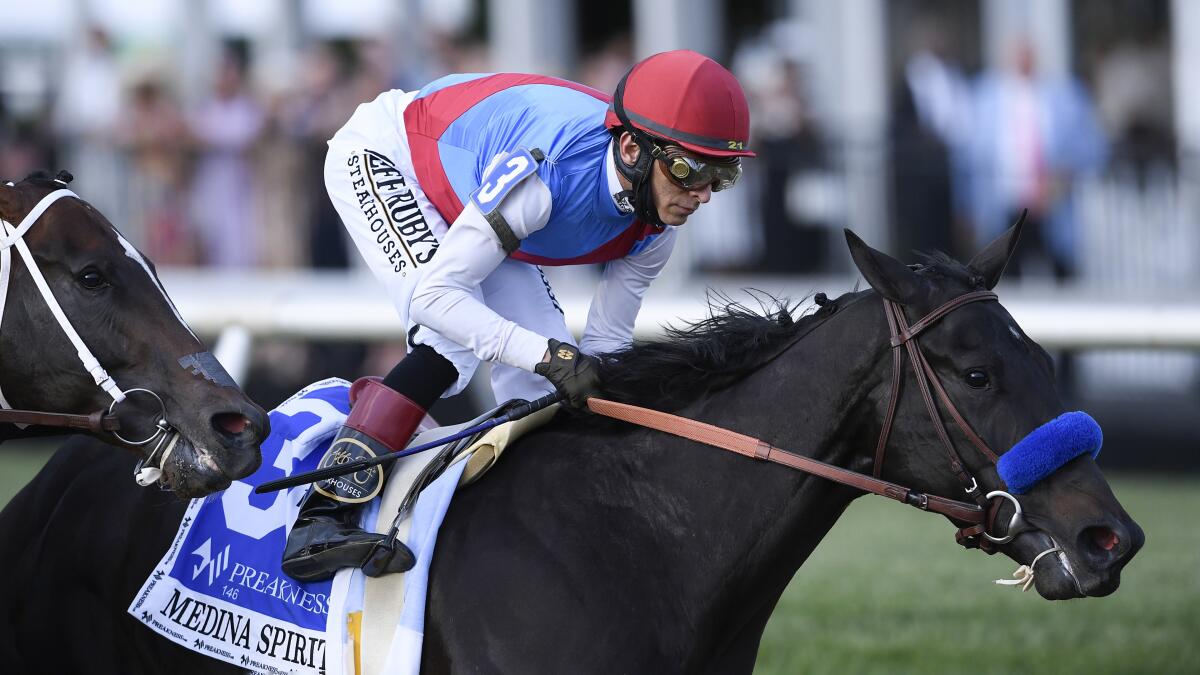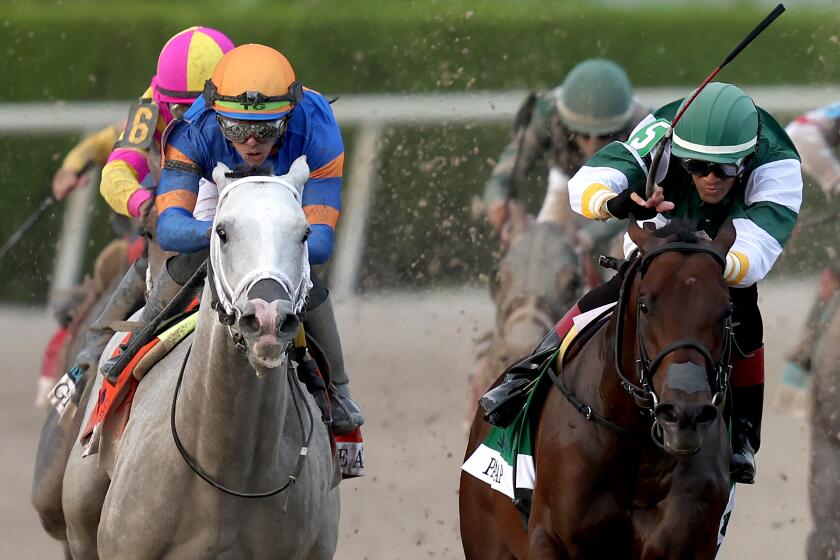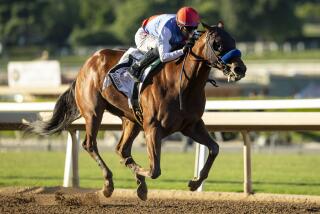Kentucky regulators taped calls without consent with Baffert after Medina Spirit test

The tension between trainer Bob Baffert and the Kentucky Horse Racing Commission has been increasingly heightened since he was notified May 8 last year that his then Kentucky Derby winner, Medina Spirit, tested positive for an anti-inflammatory that is legal except on race day.
It was in the hours after Baffert learned of the positive test that the Kentucky Horse Racing Commission took the extraordinary measure of recording without consent three phone calls it had with the trainer, which could be a violation of California law.
In transcripts of the calls reviewed by The Los Angeles Times, Baffert proclaimed his innocence, doubted the results, demanded an investigation, and asked that hair and DNA samples be taken of Medina Spirit to prove that this was just a big mistake. He volunteered that he and everyone in his barn would take a lie-detector test in an attempt to exonerate himself and his horse. Baffert was unaware his calls were being recorded as he was driving to Van Nuys Airport to take a private plane to Kentucky. California is an all-party consent state, meaning that all parties have to consent to being recorded and each individual must have a reasonable expectation of not being overheard.
According to Clark Brewster, Baffert’s attorney, the KHRC did not disclose the existence of any recording or transcript until after Baffert had his hearing with the stewards, nearly 10 months after the phone calls were recorded. The existence of the recording and the possible alleged transgression likely will have no effect on current litigation. The Times has only reviewed the transcripts but not heard the recordings.
A spokesperson from the KHRC did not return a message from The Times and it is unknown if anyone at the KHRC knew about the all-party consent in the California recording law.
“I don’t know that even if it did [have an impact], if I would use it,” Brewster said. “But it does show their mindset that they were taping it. They should have just announced they were taping it and everything would have been fine. But to do it in this way, it seems as if they already had intent to try and get Bob.”
The transcript highlights Baffert’s reaction after learning of the positive test for betamethasone, which is banned on race day. The transcripts show a level of desperation, with Baffert seeking answers about something he said he didn’t know about while worrying about how it could affect his career and legacy. It contained assumptions that would in days prove to be wrong upon further investigation. Baffert is currently one of the most polarizing figures in horse racing with both a large number of detractors and very loyal supporters.
Trainer Bob Baffert was denied an emergency stay by the Kentucky Court of Appeals and already has begun to take down signage at his Santa Anita barn.
“This is something wrong and this is horrible,” Baffert said to stewards Barbara Borden, Butch Becraft and Tyler Pickelsimer, according to the transcript. “It’s not only horrible for racing but I mean, this is going to just do me in. I’ve got every rifle [pointed at me] and something is not right with that. I don’t know what’s going on. I don’t know if they’re pissed off at me or what, but I’m telling you, this is going to be the worst thing ever for me.
“I mean, that little horse doesn’t deserve this. He didn’t get treated with that and I don’t deserve it and it is just bull— and I don’t know what to say to you guys. But somebody made a mistake in the lab or whatever. Betamethasone, we don’t touch that, we don’t use any ointments.”
It was two days later that Baffert learned that Medina Spirit had been treated with an ointment that contained betamethasone for a skin rash. Baffert’s attorneys have contended the rule against its use only applies to injections, not topicals. Subsequent lab testing showed a metabolite that is only found in the ointment in the horse’s urine.
Brewster said Baffert’s comment about ointments was a reference to enhanced topical medications that can be used on horses, not Otomax, which contains betamethasone and was being administered to Medina Spirit.
“When he returned from Kentucky he started to go through everything and discovered that weeks earlier the horse had started to receive the ointment,” Brewster said. “The ointment was not only reported to the [California Horse Racing Board] but the Jockey Club. Nobody even thought twice about it. It’s the size of a tube of Chapstick. Bob was earnestly trying to find out how this happened.”
It’s generally agreed that the 21 picograms, one-trillionth of a gram, found in Medina Spirit’s system would not be a performance enhancer.
“Betamethasone, I mean, I wish I had fricking cameras there, but I’m telling you, this is really, really, really wrong, and I don’t know what’s going to happen here,” Baffert said. “And nobody’s going to believe me, but we got all the records, it should be in there. There is something drastically wrong. Something went wrong somewhere in the testing.”

In the transcript, Baffert brought up his previous positive test in Kentucky for betamethasone on Gamine in the Kentucky Oaks. The state-approved withdrawal period for the anti-inflammatory is 14 days. Baffert has stood firm, and shown records, that the horse was last treated 18 days before she ran. Gamine was disqualified from a third-place finish and placed ninth. Baffert paid the fine and was not suspended.
“I’m sad, but you guys are going to hang me out to dry, you guys don’t care and how could I be the only one?” Baffert said. “Why am I the only one that gets the betamethasone [positive]? And I didn’t even use it this time, you know what I mean? It’s ridiculous. I don’t know. There’s something really, really bad. There is something going on there. You guys better do a super-duper investigation on this because this is really going to be an ugly scene.”
Head steward Borden replied: “Yeah, it is going to be ugly.”
“And I’m not going to take it lying down,” Baffert said. “They better take some hair from that horse right now. They need to get hair from him and test it to see if he’s ever had betamethasone in him. I’m telling you, they need to do that right away, immediately.”
Despite winning the Kentucky Derby seven times, reduced to six with Medina Spirit’s disqualification, Baffert has not been welcomed in Kentucky lately. After the Medina Spirit incident, Churchill Downs suspended him for two years and did not allow any of his horses to earn Kentucky Derby qualifying points. Recently he transferred four of his 3-year-old horses to other trainers.
After being given a 90-day suspension by the Kentucky Horse Racing Commission, which is honored by all jurisdictions, he was not granted a stay pending an appeal, which is almost always granted and in this case resulted in added litigation. On Friday, the Kentucky Court of Appeals also denied a stay resulting in Baffert having to take down signage at his barn at Santa Anita and start to disperse his horses to other trainers. Sean McCarthy and Tim Yakteen will take over Baffert’s horses, according to the Daily Racing Form. Yakteen is a former Baffert assistant and McCarthy’s wife, Kim, is Baffert’s office manager. The suspension starts Monday.
White Abarrio’s win puts trainer Saffie Joseph Jr. in the Kentucky Derby. Secret Oath is third in Arkansas Derby and likely will run in the Kentucky Oaks.
“The state of Kentucky, they got a problem there,” Baffert said in the May 8 transcript. “And I mean, this is going to be the ugliest thing ever. And it shouldn’t have happened. I didn’t do anything wrong on my part, but I’m going to have to take [it]. … I’ve about had it, I’ve about had it with Kentucky. I mean, this is ridiculous. This is not right, and somebody [expletive] me in the test barn or there’s something going on. Somebody did something, they got the wrong horse or whatever, but betamethasone, give me a break. Come on.”
At one point in the second phone call, Baffert brought up the Horseracing Integrity and Safety Authority, which is supposed to nationalize medication and safety rules when it takes effect in July.
“I wish the federal thing had already kicked in because they would understand this,” Baffert said. “But being … regulators, you guys just have to … Whatever, it’s not the same. You’re not allowed to use common sense. You have to go by what they tell [you], but I understand that.”
Brewster put it this way.
“I told Bob the fight has 15 rounds. This is only round three.”
More to Read
Go beyond the scoreboard
Get the latest on L.A.'s teams in the daily Sports Report newsletter.
You may occasionally receive promotional content from the Los Angeles Times.













